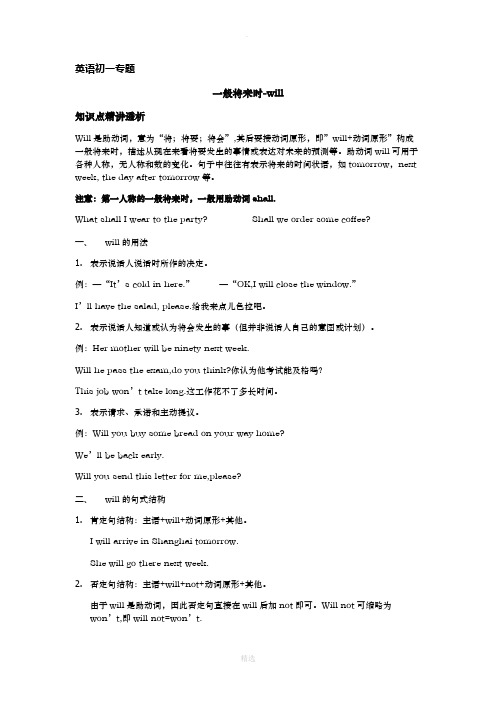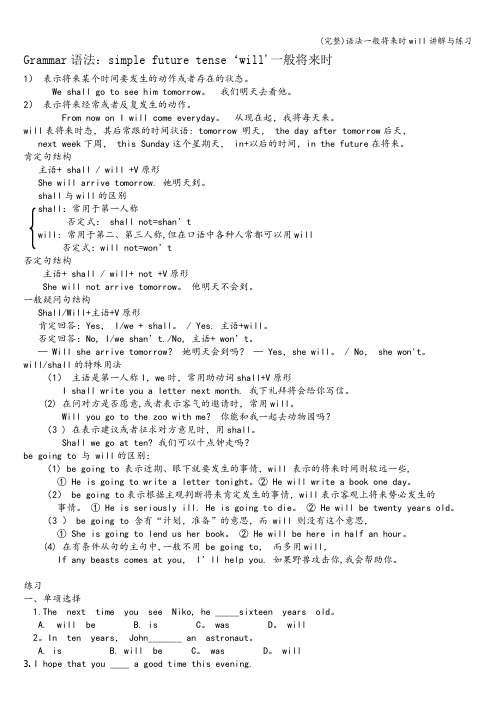语法一般将来时will讲解与练习图文稿
一般将来时begoingto与will的解析和练习

练习4: 完形填空
The party (1) at 8 pm tomorrow. We (2) many things to prepare. First, we (3) some food and drinks. Then we (4) the furniture and (5) some music. We hope you can join us!
使用正确的动词和时间状语。
练习8: 用一般将来时回答问题
使用正确的动词形式描述将发生的事情。
一般将来时中的日常口语表达
常用短语
1. I am going to… (我打算… ) 2. She will probably… (她可能会… ) 3. He will most likely… (他很可能会… )
一般将来时 bgoingto 与 will 的解析和练习
一般将来时是英语中最常用的时态之一,它用来描述将要发生的事情或预测 未来。本文将讨论一般将来时的两种构成方式:be going to 和 will。我们将 解析它们的用法,区别,在多种情景中的应用,并提供丰富的练习来帮助你 熟练掌握这种时态。
一般将来时的概述
时间状语从句的使用方法
时间状语从句用于描述一种更具体的时间或日期,并且通常以连词“when”或 “while”开始。
其他表示未来的形式
除了一般将来时,还有许多其他描述未来的语法形式,如进行时将来时和完 成时将来时。
一般将来时中的动词时态
动词时态用于描述正在进行的动作,是否完成或是否在将来进行。未来进行时态,将来完成时态和现在 完成进行时态均用于将来某个时刻或动作的描述。
练习3: 改变句子的时态
练习1
改写下面的句子,用将来进行 时: "I will be studying English tomorrow."
2020年六年级英语一般将来时will讲解PPT

-- _W__il_l ________ your mother go shopping this weekend? -- No, _s_h_e_________ _w_o_n_’t________.
3. -- 下周六你在这吗? -- 我不在。我要去拜访我的老师。
2. The man will come here.
变成否定句: __T_h_e__m_a_n_w__il_l _n_ot__c_o_m_e__h_e_re_.____________________________ 变成一般疑问句:__W_i_ll_t_h_e__m_a_n__co_m__e_h_e_r_e_?___________________________ 肯定回答:__Y_e_s_, _h_e_w__il_l._________ 否定回答:__N_o_,_h_e_w__o_n_’t_. ____________
4. What will your little brother does? _d_o_______
5. There will is a football match. _b_e_______
二、根据中文意思,把下面的句子补充完整。
1. --下个星期二你会做什么? -- 我会去踢足球。
--What _w_i_ll________ you _d_o__________ next week? -- I _w_i_ll_________ play football.
-- _W__il_l________ you _b_e__________ here this Saturday? -- No, _I__ w__o_n_’t_. I _w_i_ll_ _v_i_s_it________ my teacher.
最新一般将来时课件will的用法课件ppt

Functional Practise:
1.Ihope that you__ a good time this evening. C
A.have B.are having C.will have D.has
jobs.
dull jobs.
Will he do dull Yes, he will.
jobs?
No ,he won`t.
There will be a There won`t be Will there be a Yes,there will. computer in it. a computer in it. compuer in it. No,there won`t.
一般将来时课件will的用法
我们除了用“be going to+动词原形” 可以表示一般将来时外, 我们还可以用“will+ 动词原形”来表示一般 将来时.
一般将来时的主要用法:
1、表示将来某一时刻的动作或状态: We will come to see you the day after tomorrow. There will be a wonderful show next week.
will句式总结:
肯定
否定
一般疑问 回答
I will have
I won`t have Will I have
Yes,I will.
many presents. many presents. many presents? No,I won`t.
He will do dull He won`t do
一般将来时will

英语初一专题一般将来时-will知识点精讲透析Will是助动词,意为“将;将要;将会”,其后要接动词原形,即”will+动词原形”构成一般将来时,描述从现在来看将要发生的事情或表达对未来的预测等。
助动词will可用于各种人称,无人称和数的变化。
句子中往往有表示将来的时间状语,如tomorrow,next week, the day after tomorrow等。
注意:第一人称的一般将来时,一般用助动词shall.What shall I wear to the party? Shall we order some coffee?一、will的用法1.表示说话人说话时所作的决定。
例:—“It’s cold in here.”—“OK,I will close the window.”I’ll have the salad, please.给我来点儿色拉吧。
2.表示说话人知道或认为将会发生的事(但并非说话人自己的意图或计划)。
例:Her mother will be ninety next week.Will he pass the exam,do you think?你认为他考试能及格吗?This job won’t take long.这工作花不了多长时间。
3.表示请求、承诺和主动提议。
例:Will you buy some bread on your way home?We’ll be back early.Will you send this letter for me,please?二、will的句式结构1.肯定句结构:主语+will+动词原形+其他。
I will arrive in Shanghai tomorrow.She will go there next week.2.否定句结构:主语+will+not+动词原形+其他。
由于will是助动词,因此否定句直接在will后加not即可。
七年级下册一般将来时复习讲解与练习

感谢您的观看
THANKS
七年级下册一般将来时 复习讲解与练习
目录 CONTENT
• 一般将来时的基本概念 • 一般将来时的语境与运用 • 一般将来时的练习与巩固 • 常见错误与纠正方法 • 一般将来时与其他时态的比较 • 综合练习与测试
01
一般将来时的基本概念
定义与用法
定义
一般将来时是表示将来某个时间将要 发生的动作或存在的状态,常与表示 将来的时间状语连用,如tomorrow 、next week等。
总结词:提高运用能力
在此添加您的文本16字
详细描述:通过填空练习,让学生在实际语境中运用一般 将来时,提高语言运用能力和语境理解能力。
在此添加您的文本16字
总结词:拓展词汇和表达方式
在此添加您的文本16字
详细描述:在填空练习中,可以加入一些常用词汇和表达 方式,帮助学生拓展语言知识,提高语言表达能力。
综合写作练习
总结词
提升写作水平
详细描述
通过写作练习,让学生在实际写作中运用一般 将来时,提高写作水平和表达能力。
总结词
培养逻辑思维能力
详细描述
在写作练习中,可以引导学生思考和组织语言,培 养逻辑思维能力,提高写作质量。
总结词
促进语言实际运用能力
详细描述
写作练习可以让学生在实践中运用语言,提高实际运用 能力和跨文化交流能力。
与过去时区分
过去时表示已经发生的事情,而一般将来时表示尚未发生的事情。例如,“我昨 天去了超市”应该使用过去
03
一般将来时的练习与巩固
填空练习
总结词
填空练习是巩固一般将来时的有效方法,通过填空练习,学生可以加深对一般将来时态的理解和运用 。
一般将来时态讲解(共25张PPT)

• I don't think the test will be very difficult. 。
②用于“祈使句 + and + 陈述句” 中
I don’t think it will rain this afternoon.
I am hungry. I think I’ll have something to eat.
表示看法,观点
“There be”句型的一般将来时 肯定句: There will be +名词+其他成份 [注意]:无论后面加单数名词或复数形式,be都必须用原形。
shall适用于第一人称I,We;而will适用于所有人称。 通常可以用will来代替shall。 will,shall均可缩写为:'ll,如:
I will= I'll; she will = she’ll;will not 和shall not分别可以 缩写为 won't 和shan't。
1.一般将来时的用法
4. be about to + 动词原形。 表示 (1)“即将做”或“马上做”
(2)因此,句子不能再用时间状语。
Don’t leave. Li Lei is about to come. 不要走了,李蕾就要来了。 Be quiet. The concert is about to start. 安静下来,音乐演唱会就要开始了。
• My uncle will come to see me every Saturday.
• 我叔叔每个星期六都会来看我。
• The students will have five English classes per week this term.
《Will一般将来时》课件

1 Positive
主语 + will + 动词
2 N eg ative
主语 + will not + 动词
3 Question
Will + 主语 + 动词
一般将来时的用法
表达意愿
我将会去参加明天的会 议。
预测未来
明天会下雨。
提出建议
你应该明天早点休息。
例句和练习
1
例句
明天我将和朋友去看电影。
例句
意愿、预测、建议等
技巧
表达自信、使用时间表达、 多练习
使用一般将来时的技巧
Be confident
积极表达信心和决心。
Use tim e ex p res s io n s
明天、将来、下个星期 等词汇可以增强时态的 表达。
Practice with exercises
多做一些练习可以更好 地掌握一般将来时的用 法。
总结和要点
构成
will + 动词
用法
2
他明天不会来上班。
3
练习
请用一般将来时造句:
明天我们将去旅行。
注意事项和常见错误
1 D on't forg et
the subject
错误:Will go to the party.
正确:I will go to the party.
2 D on't use
c o n trac tio n s in form al writing
错误:I'll finish it tomorrow.
正确:I will finish it tomorrow.
(完整)语法一般将来时will讲解与练习

Grammar语法:simple future tense‘will'一般将来时1)表示将来某个时间要发生的动作或者存在的状态。
We shall go to see him tomorrow。
我们明天去看他。
2)表示将来经常或者反复发生的动作。
From now on I will come everyday。
从现在起,我将每天来。
will表将来时态,其后常跟的时间状语: tomorrow 明天, the day after tomorrow后天,next week下周, this Sunday这个星期天, in+以后的时间,in the future在将来。
肯定句结构主语+ shall / will +V原形She will arrive tomorrow. 她明天到。
shall与will的区别shall:常用于第一人称否定式:shall not=shan’twill: 常用于第二、第三人称,但在口语中各种人常都可以用will否定式:will not=won’t否定句结构主语+ shall / will+ not +V原形She will not arrive tomorrow。
他明天不会到。
一般疑问句结构Shall/Will+主语+V原形肯定回答:Yes, I/we + shall。
/ Yes. 主语+will。
否定回答:No, I/we shan’t./No, 主语+ won’t。
— Will she arrive tomorrow?她明天会到吗?— Yes,she will。
/ No, she won't。
will/shall的特殊用法(1)主语是第一人称I,we时,常用助动词shall+V原形I shall write you a letter next month. 我下礼拜将会给你写信。
(2) 在问对方是否愿意,或者表示客气的邀请时,常用will。
Will you go to the zoo with me?你能和我一起去动物园吗?(3 ) 在表示建议或者征求对方意见时,用shall。
- 1、下载文档前请自行甄别文档内容的完整性,平台不提供额外的编辑、内容补充、找答案等附加服务。
- 2、"仅部分预览"的文档,不可在线预览部分如存在完整性等问题,可反馈申请退款(可完整预览的文档不适用该条件!)。
- 3、如文档侵犯您的权益,请联系客服反馈,我们会尽快为您处理(人工客服工作时间:9:00-18:30)。
语法一般将来时w i l l讲
解与练习
集团文件发布号:(9816-UATWW-MWUB-WUNN-INNUL-DQQTY-
Grammar语法:simple future tense‘will’一般将来时
1) 表示将来某个时间要发生的动作或者存在的状态。
We shall go to see him tomorrow. 我们明天去看他。
2) 表示将来经常或者反复发生的动作。
From now on I will come everyday. 从现在起,我将每天来。
will表将来时态,其后常跟的时间状语: tomorrow 明天, the day after tomorrow后天,
next week下周, this Sunday这个星期天, in+以后的时间,in the future在将来。
肯定句结构
主语+ shall / will +V原形
She will arrive tomorrow. 她明天到。
shall与will的区别
shall:常用于第一人称
否定式: shall not=shan’t
will: 常用于第二、第三人称,但在口语中各种人常都可以用will 否定式:will not=won’t
否定句结构
主语+ shall / will+ not +V原形
She will not arrive tomorrow. 他明天不会到。
一般疑问句结构
Shall/Will+主语+V原形
肯定回答:Yes, I/we + shall. / Yes. 主语+will.
否定回答:No, I/we shan’t./No, 主语+ won’t.
— Will she arrive tomorrow
她明天会到吗—Yes,she will. / No, she won’t.
will/shall的特殊用法
(1) 主语是第一人称I,we时,常用助动词shall+V原形
I shall write you a letter next month. 我下礼拜将会给你写信。
(2) 在问对方是否愿意,或者表示客气的邀请时,常用will.
Will you go to the zoo with me
你能和我一起去动物园吗
(3 ) 在表示建议或者征求对方意见时,用shall.
Shall we go at ten
我们可以十点钟走吗
be going to 与 will的区别:
(1) be going to 表示近期、眼下就要发生的事情,will 表示的将来时间则较远一些,
① He is going to write a letter tonight.② He will write a book one day.
(2) be going to表示根据主观判断将来肯定发生的事情,will表示客观上将来势必发生的
事情。
① He is seriously ill. He is going to die. ② He will be twenty years old.
(3 ) be going to 含有“计划,准备”的意思,而 will 则没有这个意思,
① She is going to lend us her book. ② He will be here in half an hour.
(4) 在有条件从句的主句中,一般不用 be going to, 而多用will, If any beasts comes at you, I'll help you. 如果野兽攻击你,我会帮助你。
练习
一、单项选择
1.ThenexttimeyouseeNiko, he _____sixteenyearsold.
A. willbe
B. is
C. was
D. will
2.Intenyears, John_______ anastronaut.
A. is
B. willbe
C. was
D. will
3.I hope that you ____ a good time this evening.
A. have
B. are having
C. will have
D. has
4.Look at those big black clouds. It ____ rain. Let’s hurry.
A. must
B. will
C. would
D. is going to
5.There ____ a basketball match this afternoon.
A. will have
B. will be
C. has
D. have
6.We ____ to the park if it is fine tomorrow.
A. will go
B. go
C. goes
D. to go
7.There _____ a kite show in the zoo tomorrow.
A. was
B. is going to have
C. will have
D. is going to be
8. Mother ______ me a nice present(礼物) on my next birthday.
A. will gives
B. will give
C. gives
D. give
二、用一般将来时填空。
(借助will)
1. I _________ (visit) my uncle tomorrow.
2. There _______ (be) a football match in our school next week.
3. He __________ (help) you with your English this evening.
4. We _________ (have) a meeting tomorrow.
三、按要求完成下列句子。
1. I will go to school by bike.(改为一般疑问句)
________________________________________
2.He will check his e-mails this afternoon.(改为否定句)
__________________________________________.
3.Li Ming and his friends will have a piano lesson. (改为一般疑问句并作肯定和否定回答)
__________________________________________ __________.
___________.
4.There will be some robots in our homes. (改为否定句) There _____ _____ _____ _____ robots in our homes.
5.Everyone will have a small car. (对划线部分提问)
______ ____everyone _____
四、用所给词的适当形式填空
1.______ (be) you free tomorrow?
2.What _____ you _______________ (do) tomorrow morning?
3.Hurry up! Or we _____ (be) late.。
